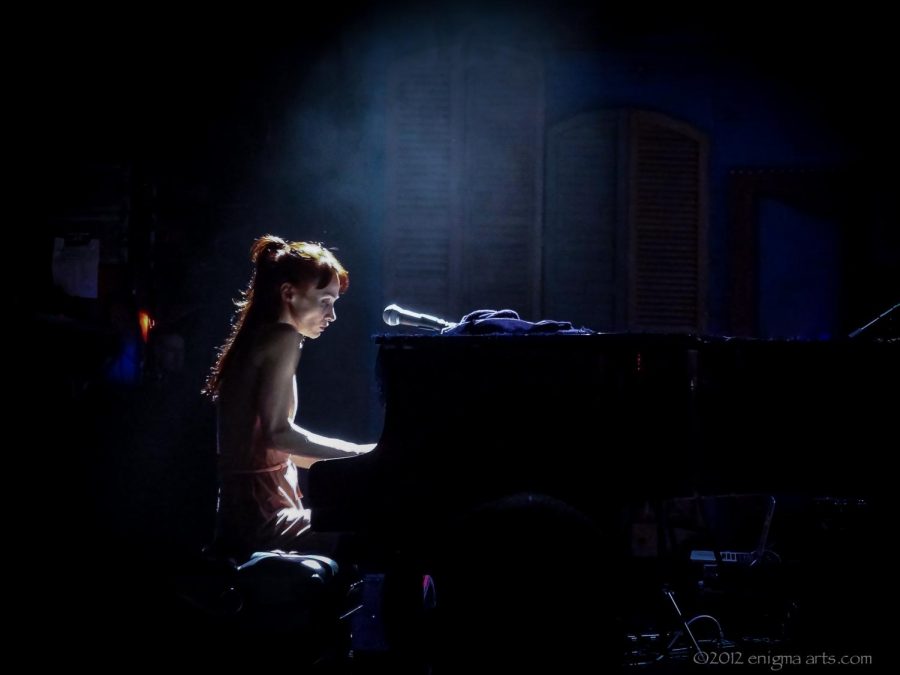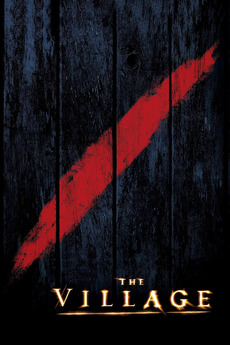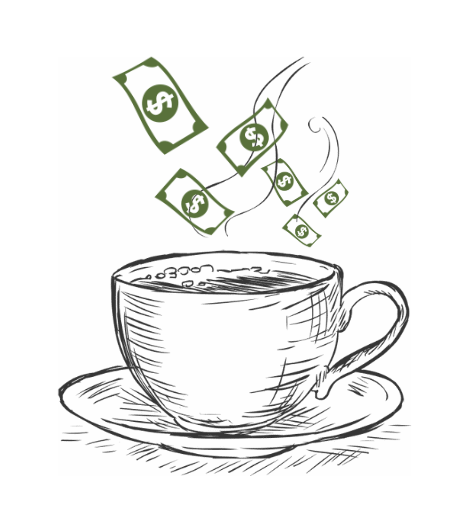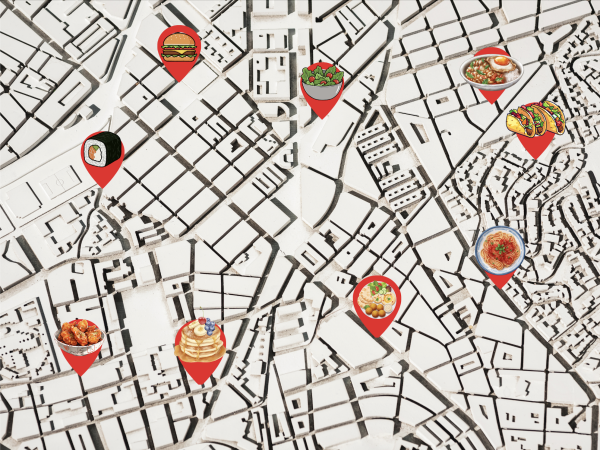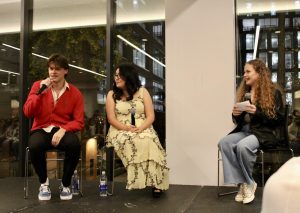Fiona Apple’s ‘Fetch The Bolt Cutters’ is a raw, eccentric ode to female empowerment and self-realization
May 8, 2020
TRIGGER WARNING: Sexual Assault and Rape
Singer/songwriter Fiona Apple is no stranger to going against the grain with her music. Both lyrically and thematically, her seldom-released projects often cover difficult topics, with her 1996 release “Tidal” exploring topics such as the then rarely-discussed detrimental mental effects that result from sexual assault, to her 2017 LP “The Idler Wheel…” offering insights into topics like the easy-to-neglect negative aspects of a toxic relationship.
In the time of strong recognition and revolt towards hegemonic masculinity that we live within today, Apple’s release of her newest album “Fetch The Bolt Cutters” is timely. Touching upon more topical subjects like the #MeToo movement and the institutionalized oppression of women in general, Apple maintains her status as a beacon of inspiration for many women suffering such hardships.
This album feels particularly different compared to her other unique works. As any artist is bound to go through aesthetic changes after a considerably long hiatus, Apple sounds rawer and fiercer than ever, even to the point that her new minimalistic and intentionally “unfinished” sound is almost unheard of.
Although her previous releases have effortlessly offered a stark exhibition of self-actualization and bluntness, the listener feels most familiar with Apple on “Fetch The Bolt Cutters,” as even her production sounds more fragmentary than ever before – although in the most entrancing way. Through whispers, voice cracks, sharp breaths, imperfect pianos, makeshift percussion and yes, even dog barks, Apple offers us an immensely personal introspection that we have never seen before.
The record kicks off charmingly with the intro track “I Want You To Love Me,” a melodious and poignantly innocent ballad to a potential partner that evokes the juvenile hopefulness that comes with falling in love. The listener is instantaneously grabbed by Apple’s visceral and unapologetic tone of unadulterated “want,” a word that is effectively reiterated throughout the track. When speaking upon the track, the artist told Vulture: “That whole thing of, ‘if a tree falls in the forest and no one’s around to hear it, does it make a sound?’ Yes, it does. Because a vibration happens. Whether or not you’re there to hear it. I exist whether or not you see me. These things about me are true whether or not you acknowledge them.”
Apple passionately belts these pleas of being seen and loved over a combination of fluttering key progressions and hard-hitting kick drums, before progressing into the usual display of experimentation that the artist has so effortlessly delivered in the past by letting her vocals spiral into a disconcerting yet mesmerizing semi-laughter at the end of the track, a bit that is sure to set the tone for the remainder of the album’s stunning madness.
The end of this segment blends seamlessly into the sonically juxtaposed “Shameika,” arguably the most buoyant track on the record, in which Apple swiftly delivers the narrative of a group of bullies from her childhood that, despite not being friendly to her, got through to her and brought to light her previously self-unacknowledged “potential” at a particularly young age.
This track once again transitions into another contrast of sound with the starkly bare-boned title track, “Fetch The Bolt Cutters.” With an ensemble of scattered pseudo-percussion, lulled vocals, and even a feature from her credited dogs Mercy, Maddie, Leo, Little and Alfie, the singer crafts a spiteful chant of jadedness and resentment towards the psychological walls that enclose one within their own mental prison, whether formed by one’s own subconscious or built by the scrutiny of others. Hence the lyrics, “Fetch the bolt cutters, I’ve been in here too long.”
But as most Apple records do, the artist goes far beyond a theme of self-realization and self-love and delves deeper into issues that pertain to today’s sociopolitical climate and the modern-day feminist movement. In the #MeToo era, female artists across genres are courageously opening up about their experiences with harassment and sexual abuse in a male-dominated industry and world, and Apple certainly is no exception. She makes her vehemence towards the subject abundantly clear, sometimes even to a possibly triggering extent. The unforgettably soul-stirring track “For Her,” which was written in the wake of controversial Supreme Court Justice Brett Kavanaugh’s nomination hearings, she frankly recites experiences that several women she’s been acquainted with have had with sexual assault and rape, including the punch-to-the-gut line: “You raped me in the same bed your daughter was born in.”
Apple also delivers some similar harrowing yet necessary narrative on the song “Newspaper,” in which she acknowledges how suppressed trauma can make one feel isolated, yet at the same time can offer a sense of connection when bonding over the endurance of such experiences with another person. More specifically, the song seems to be about the new girlfriend of an ex of Apple’s, as she voices her regret of not being able to get closer to this woman while she still had the chance, and the pain of watching from the sidelines as her ex-lover manipulates and lies to his new partner, as she has experienced the same. The lyrics “I too used to want him to be proud of me/And then I just wanted him to make amends/I wonder what lies he’s telling you about me/To make sure that we’ll never be friends…” specifically stand out as an exceptional illustration of the toxicities of a relationship turned sour, along with the aftershock of it.
Although “Fetch The Bolt Cutters” is in no shortage of solemn tracks, that does not mean that it lacks a sense of playfulness and wit. The song “Under the Table,” for example, contains many comedic instances, most of which resulting from Apple’s straightforward jadedness and adamancy towards her significant other as they drag her to places and events that she quite obviously couldn’t care less about, a fact that she is not hesitant to make clear, as the track unashamedly opens up with the artist singing “I told you I didn’t want to go to this dinner.” Even the hook of this song, at least in its most literal sense, paints some admittedly humorous imagery, as the thought of her partner kicking her under the table to prevent her from embarrassing him and her refusing is brilliant.
The swaying song “Ladies” also captures this sense of playfulness. Apple extravagantly addresses her female counterparts, frenemies, and listeners by making the hook a joyfully ludicrous and simple repetition consisting of her suavely singing, “Ladies, ladies, ladies, ladies.” In contrast to the very robust yet justifiable bitterness and resentment that the singer puts forth towards sour relationships on a good majority of the tracks on the record, Apple’s tone feels more inviting and unifying on “Ladies,” even including a bit in which she invites her ex-lover’s new girlfriend to make use of all the memorabilia that she once held dearly: “There’s a dress in the closet/Don’t get rid of it/You look good in it/I didn’t fit in it/It was never mine/It belonged to the ex-wife of another ex of mine.”
Apple goes into entirely new depths on “Fetch The Bolt Cutters”—not just with her new sound, but lyrically, too. Sure, upon first listen, what may be most predominant are the unconventional rough-and-ready drums, the twangy guitars, and the beautifully bizarre vocal progressions. But upon a deeper and more scrupulous listen, it’s clear that the artist is more fed-up, trenchant, and outspoken than ever; her gnarled words and demanding commandments is evidence enough that Apple has spent enough time in the cage of suppression from a man’s world, and it’s about time that she broke free. This conceptual aspect, when paired with her home-studio aesthetic, makes us feel closer and more intimate with the enigma of an artist than ever before.

